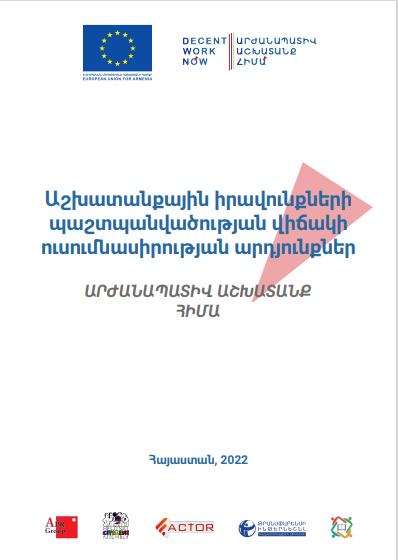In the frame of ’’Decent Work Now’’ project, APR Group NGO conducted a baseline study with the view to identifying the general situation of labor rights in Armenia. The action is being implemented by HCA Vanadzor, Transparency International Anti-Corruption Center, APR Group NGO and Factor Information Center, in cooperation with the Education and Solidarity trade union.
The quantitative survey was implemented in all the provinces of the Republic of Armenia and Yerevan among 1062 employees during face-to-face meetings. The representative sample allows applying the data to the working population at 95% confidence interval with a 3% margin of error. The sample was distributed in provinces and communities in proportion to the number of residents. The surveys were conducted using computer technologies, which made it possible to ensure a high level of oversight of field work.
This summary of the survey results singles out a few provisions and the relevant interventions envisaged in the frame of the action:
-
16․7% of the respondents do not have an employment contract and in case of 13․9% of the respondents only an order to hire was issued. As a result of the lack of legal enactment of labor relations, employees are deprived of the opportunity to be protected by labor legislation. In such cases, employers do not make any effort to ensure decent working conditions and an adequate treatment. 7.2% of the respondents mentioned that they worked overtime every day. Only 28.4% of those who had ever worked overtime received an additional payment. 7.8% of the respondents work in shifts, 24 hours a day. 39.2% of the respondents working night shifts had never received compensation. 8,5% of this group of respondents noted that remuneration for night work was at the discretion of the employer, while 12,8% of the respondents found it difficult to answer the question. 27,5% of the respondents almost always or often work on non-working days, while 26.8% sometimes work on non-working days. 54.4% of them mentioned that it was considered a regular working day, and no extra payment was provided:
It is necessary to raise public awareness regarding labor relations safeguards by encouraging citizens to demand to sign an employment contract when being hired and to strive to work within the limits of the enshrined legal relations.
-
8% of the respondents mentioned the existence of a high level of exposure to hazard factors in their workplace, while 16.9% did not assess those factors as pretty high. Working conditions were assessed as hazardous by those working in the defense sector, followed by those in construction, processing industry, and healthcare sectors. Dust, humidity, steam (30.3%), noise above the permitted level (18.7%), radiation (16.6%) were mentioned most among factors affecting health in labor conditions. It is worrisome that 79.2% of the respondents do not get any compensation if hazard factors exist in their workplace. Moreover, about 40% of those respondents did not discuss the issue of hazardous labor conditions with their employer or supervisor. While no COVID-19 preventive measures were taken in workplaces of 2,9% of the respondents, 46․7% of the respondents had tested positive for COVID-19. 36․4% of the respondents did not work or were in enforced idleness due to the pandemic, and 54,7% of them were paid fully for that period.
It is necessary to provide legal advice and guidance, as well as to cooperate with the relevant bodies, in particular, Health and Labor Inspection Body, to reach individual and systemic solutions to such issues.
-
9․8% of employees are not aware that they have the right to annual paid leave, while half of them are not aware of its duration and conditions. They are not well aware how salary is calculated, and do not know what they should or can do when they perform tasks not envisaged by the employment contract or agreement. Employees are not always able to express their discontent about working conditions, labor relations, remuneration, vacation, or other issues.
It is necessary to organize training of employees and their representatives by using the potential of non-governmental organizations, state organizations as well as trade unions.
-
7% of the respondents (92 persons) had health problems (mutilations, occupational diseases) related to profession, job peculiarities or bad labor conditions. Only half of those persons received compensation from their employer. At the same time, respondents are sure that a differentiated positive attitude is manifested in workplace in connection with an employee’s health state, such as pregnancy (57.8%) or disability (49.7); while there is a negative attitude (49.0%) in connection with gender (including sexual orientation and identity).
Non-governmental organizations, state organizations and employers should focus on efforts aimed at ensuring equal labor opportunities for all employees. Those actions should be taken in all spheres, including physical adaptation of the workplace and change of mindset and worldview. In this regard, it is necessary to take actions towards developing policies and localizing and popularizing best practices. It is necessary to establish in the society the approach that employees are valued based on their skills and performance, while factors such as sex, age, gender affiliation, physiological traits, etc., are not decisive.
-
Only 15.2% of those who have ever expressed their dissatisfaction regarding working conditions to their employer, immediate supervisor or superior body had the relevant issue resolved as a result of expressing dissatisfaction, 45.8% had the issue partly resolved, while 35.6% did not reach any solution. The majority of the respondents (85.7%) mentioned that they had never united with colleagues against the employer in order to solve an issue or protect their labor rights. At the same time, if such protests take place, half of the respondents are sure they will be resolved for the benefit of employees. Only 28.3% of the respondents had trade unions in their workplace. Half of the respondents attach importance to trade unions as an institute providing material and moral support. Only 10.9% of them consider trade unions as a means for restoring violated rights, 4.5% view it as a means for receiving free of charge consultation, and 4.1% consider trade unions as a means of not feeling alone. 23.2% of the respondents mentioned that they did not gain anything from trade unions or found it difficult to answer the question as to what they gain from trade unions. Overall 1215 answers were given to the question “Who would you apply to in order to protect your labor rights?”; 51.8% answered “to my immediate supervisor or employer”, 10.3% answered “to colleagues”, 4.7% answered “to a lawyer”, 3.6% answered “to the Office of the Human Rights Defender”, 2,7% answered “to court”, and 2․4% answered “to the trade union”. 0,9% were willing to apply to the Health and Labor Inspection Body. Those who mentioned the option of applying to trade unions were mainly respondents working in education (58.6%) and healthcare (10.3%) sectors. Those who mentioned the option of applying to Health and Labor Inspectorate were mainly respondents working in education (36.4%) and healthcare (27.3%) sectors.
While respondents claim that applying immediately to the employer mainly leads to favorable results, making a complaint can also be grounds for dismissal. In this regard, it is necessary to cooperate with trade unions of different sectors, conduct capacity building in terms of collective protection of labor rights and contribute to implementation of mechanisms of labor rights protection, and introduction of the relevant legislative practice.
——————
This publication was produced with the financial support of the European Union. Its contents are the sole responsibility of APR Group and do not necessarily reflect the views of the European Union.




